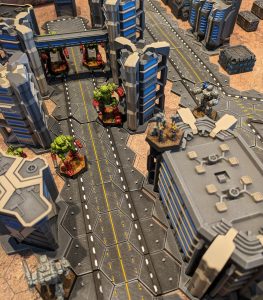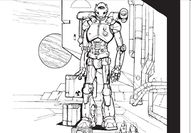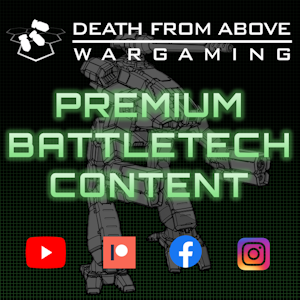Patron
Sarna News

- HEXTECH Review - Wave 3 Brings More Urban Options To Your Battlefield
- Your BattleTech News Round-Up For March, 2024
- Crashing 'Mechs With Jennifer Brozek, Author Of The Rogue Academy Trilogy
- Getting The Word Out With Rem Alternis, Catalyst Community & Marketing Director
- Bad 'Mechs - Yeoman
- Read more →
This article may require cleanup to meet BattleTechWiki's quality standards. The specific problem is: review needed. |

| |
| Patron | |
|---|---|
| Production information | |
| Manufacturer | Atrean Robotics
|
| Use | Ammunition Loading 'Mech
Cargo handling |
| Model | LoaderMech |
| Equipment Rating | D/D-D-C/C |
| Class | Ultralight |
| Introduced | 2550[1] |
| Cost | 634,198 C-bills |
| Technical specifications | |
| 'Mech type | Inner Sphere IndustrialMech |
| Mass | 15 tons |
| Chassis | |
| Armor | Type 7 IndiPlate Commercial [BAR 5] |
| Engine | Vlar 30 PowerStack fuel cell |
| Communications System | Apple Communicator[2] |
| Targeting Tracking System | None[2] |
| Heat Sinks | 1 single heat sink |
| Speed | 30 km/h |
| Armament |
|
| BV (2.0) | 74[2] 106[3] 67[4] |
Contents
Description[edit]
The Patron was designed as an ammunition reloader for the League's first BattleMech design, the Icarus. One of the first LoaderMechs produced in the Inner Sphere, it was created in the Free Worlds League by Atrean Robotics. The IndustrialMech was highly successful in its logistical support role for the later Icarus II, which propelled Atrean Robotics into expanding its production facilities to 16 worlds in the League.[2]
After the phaseout of the Icarus II, a more general purpose model of the Patron entered service, replacing the original Icarus specialized models, with few of these specialized models being found in various museums in the League. The Succession Wars did not bode well for Atrean Robotics; they went out of business from the sheer destruction of the age, resulting in the Patron fading away in the annals of history.[2]
In turbulent times of the Jihad, Graham-Davis Enterprises resumed production of the ancient IndustrialMech back in its factory on Tamarind. The newly built Patrons were utilized with Marshal Photon Brett-Marik leading the Duchy of Tamarind FWLM forces against the Lyran and Word of Blake assaults of 3074.[2]
The 'Mech's reappearance became a source of hope for House Marik's people when a holovid of one the 'Mechs once again seen servicing a newly-built Icarus II in the field was made.
Weapons and Equipment[edit]
This 15 ton 'Mech utilizes its hand actuators to lift ammunition racks into BattleMechs. To help it move equipment and ammunition around, it is equipped with a lift hoist mounted in its right torso, and also equipped with a sprayer in its main body to cool down overheated BattleMechs returning from the field. It carries 0.87 tons of insulated liquid storage for the sprayer in its cargo bay. It has been optimized for night operations by having a searchlight mounted on its left torso.[2]
The 'Mech's power plant, a fuel cell-powered Vlar 30-rated engine is capable of moving the 'Mech at 32 km/h. It is lightly protected with one and a half tons of commercial armor, which makes the 'Mech highly vulnerable to damage.[2]
Variants[edit]
- Patron (Prototype)
- The first prototypes of the design premiered with the original Icarus in 2470 and utilized primitive technology and as such, the 'Mech's components were heavier. The prototypes featured a primitive cockpit and a larger, less efficient engine. To make room for these bulkier systems, the 'Mech was only equipped with a single lift hoist and had a half ton cargo bay. The prototype design was specialized to service only the Icarus II. BV (2.0) = 67[5]
- PTN-2 MilitiaMech
- This variant of the Patron is designed to support the conventional infantry forces normally found in militia units. Though the armor protection and top speed remains the same, the PTN-2 carries four light machine guns and five Rocket Launcher 10s. The machine guns can quickly chew up enemy infantry, while the rocket launchers provide additional punch against battle armor or light tanks. The searchlight from the original Patron remains in place. BV (2.0) = 143[6]
- PTN-2M PatrolMech
- This Patron variant carries three Rocket Launcher 10s and four light machine guns. Unlike the MilitiaMech version, this Patron model carries two tons of heavy industrial armor, providing it with much better protection. BV (2.0) = 147[7]
Design Quirks[edit]
The PTN-2M Patron variant is subject of the following Design Quirks:[7]
Related Designs[edit]
- Shugosha - A Draconis Combine 20-ton version of the Patron, which is notable for having a fusion engine.
Gallery[edit]
Original Patron from TRO:3075
Experimental PTN-2 Patron MilitiaMech from XTRO:RetroTech
PTN-2M Patron PatrolMech from TRO:Prototypes
References[edit]
- ↑ MUL online date for the Patron
- ↑ 2.0 2.1 2.2 2.3 2.4 2.5 2.6 2.7 Technical Readout: 3075, p. 262: "Patron LoaderMech"
- ↑ Record Sheets: 3075 Unabridged, p. 251
- ↑ Record Sheets: 3075 Unabridged - Age of War, p. 171
- ↑ Record Sheets: 3075 Unabridged - Age of War, p. 170
- ↑ Experimental Technical Readout: RetroTech, p. 3
- ↑ 7.0 7.1 Technical Readout: Prototypes, p. 95




